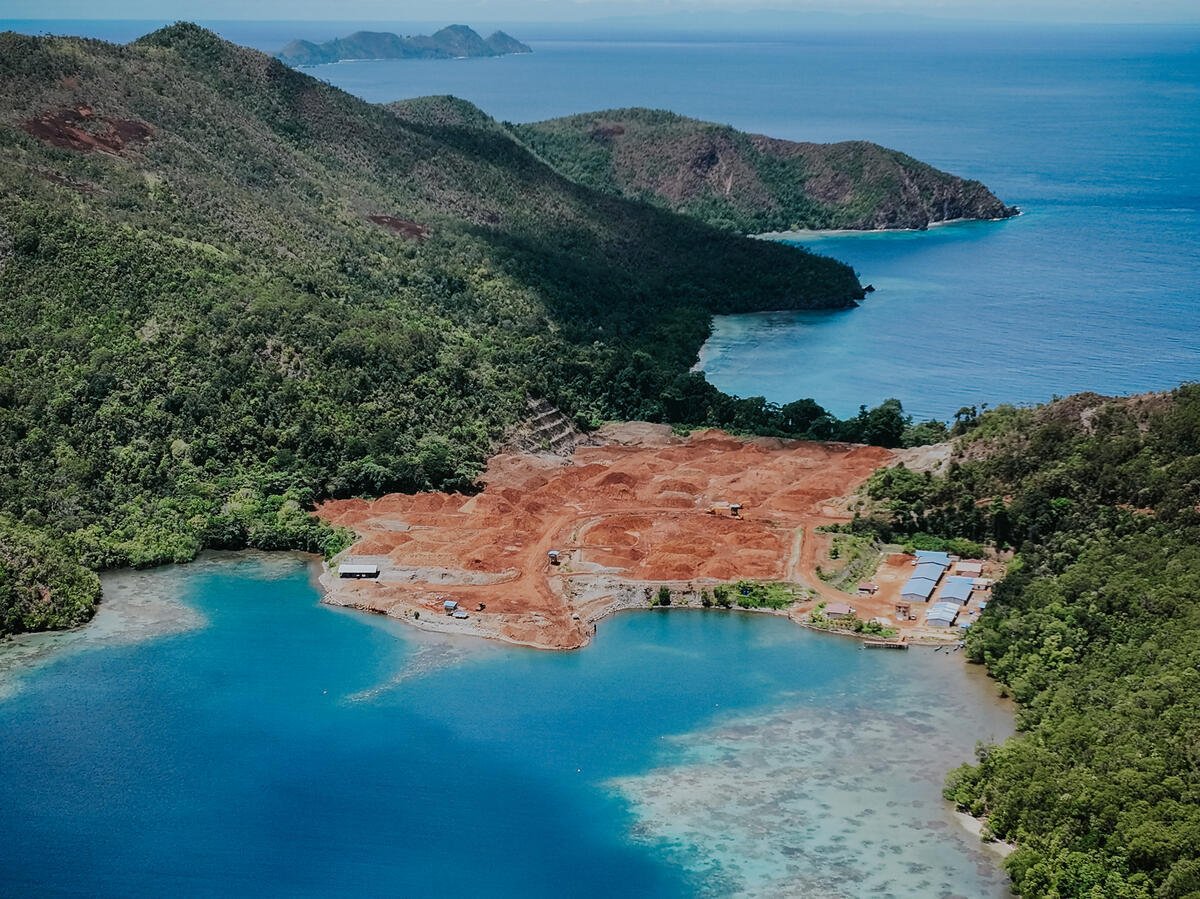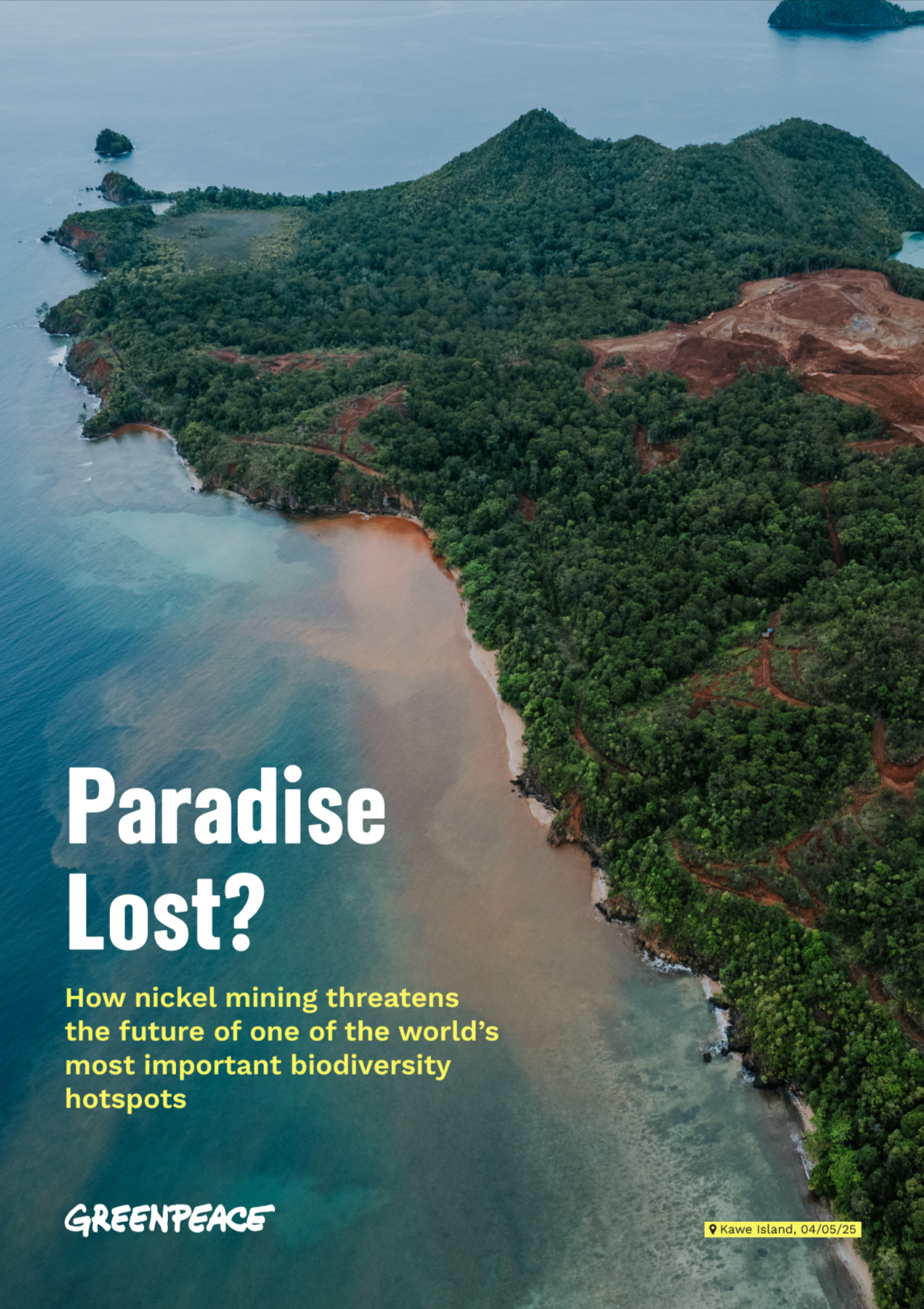The Story of a Survivor of Alleged Human Trafficking
There are strong links between human trafficking and the illegal distant water fishing industry which enables forced labor practice on the high seas and the many companies and individuals profiting from it.
Research in 2018 said that, compared to the situation in the 1950s, fisheries today require twice the effort to catch the same quantity of fish. That includes fishing further out at sea, using more fuel and staying at sea longer. To keep gaining profits, fishing companies cut costs, which sometimes lead to serious labor abuses towards workers–many even related to human trafficking practices.
Syamsul, a 50-year-old Indonesian, told Greenpeace Southeast Asia about how he was allegedly trafficked when he became a migrant fisher in 2020. The United Nations Palermo Protocol states that human trafficking involves recruiting, transporting, transferring, harboring, or receiving a person through force, fraud or deception to exploit them for profit–and Syamsul experienced some of them. According to Syamsul, he was deceived upon recruitment and not paid fully after working for six months at sea. The court, however, only gave him an illusion of justice.
His case is just the tip of an iceberg (read another story here: “Don’t get trapped”: One worker’s warning about what really happens in the fishing industry). Using forced labor indicators from the International Labor Organization (ILO), the Indonesian Migrant Workers Union (SBMI) recorded 634 reports from migrant fishers throughout 2013-2021–many of which were allegedly related to human trafficking. The abuses may occur at any point along the employment stage (from the recruitment, the placement, to the repatriation), in vessels of many nationalities and involve companies from various countries.
Syamsul bravely told his story. He wants more people to be more aware of the trafficking in persons practice within the fishing industry. He calls on the Indonesian government to actually bring justice to victims like him.
He wishes he was the last person to fall victim.
—
People call me Syamsul. I’m a father of four daughters. My family lives in Tegal, a city in the Central Java region of Indonesia. Since 2010, I made ends meet mainly by relying on odd jobs—from being a construction worker to a street vendor. When I was younger, I spent time as a migrant fisher on a foreign fishing vessel for two years.
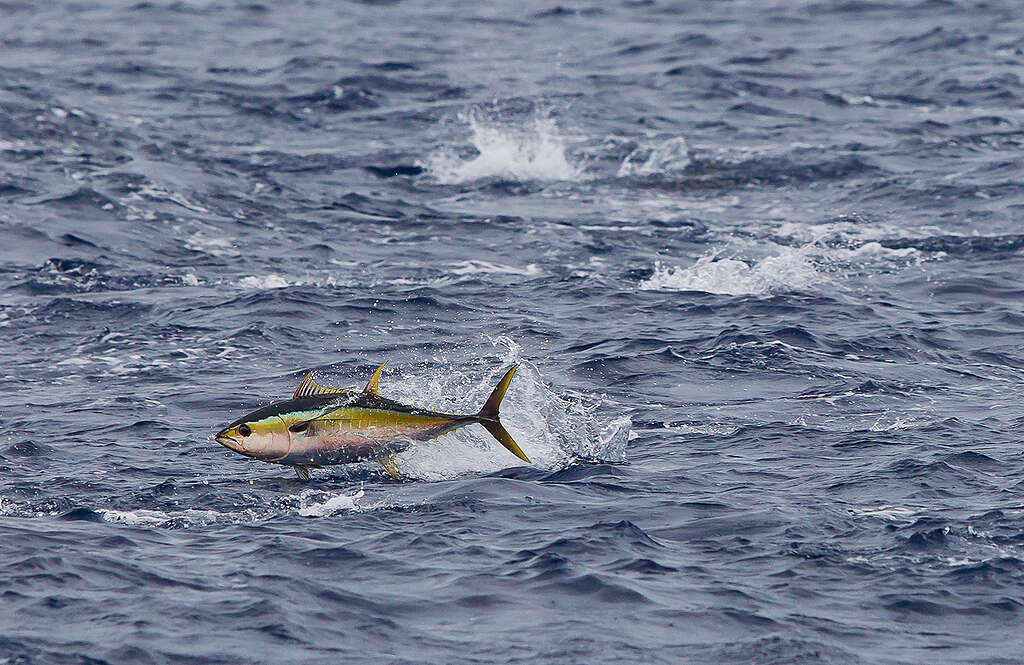
In 2019, a recruitment agency, PT Makmur Jaya Mandiri (MJM) advertised about hiring migrant fishers. I was more than ready to apply. I was tempted. I wanted to change my fate.
I got the job. I was told that I would depart in December 2019, but it got postponed until January 2020. So a week after the New Year’s celebration, I said goodbye to my family and my hometown with a heart full of hope.
What happened in the next six months was not at all what I had in mind.
From Tegal, I went to Jakarta, the Indonesian capital, and then flew to Singapore. There I was told that the ship I was about to embark on was different from the one the agency had promised prior to my departure. I was promised employment on another fishing ship, but that did not happen.
The ship, Lu Huang Yuan Yu 117, was staffed with a crew of 35 – 23 of whom, including myself, were from Indonesia and the Philippines.
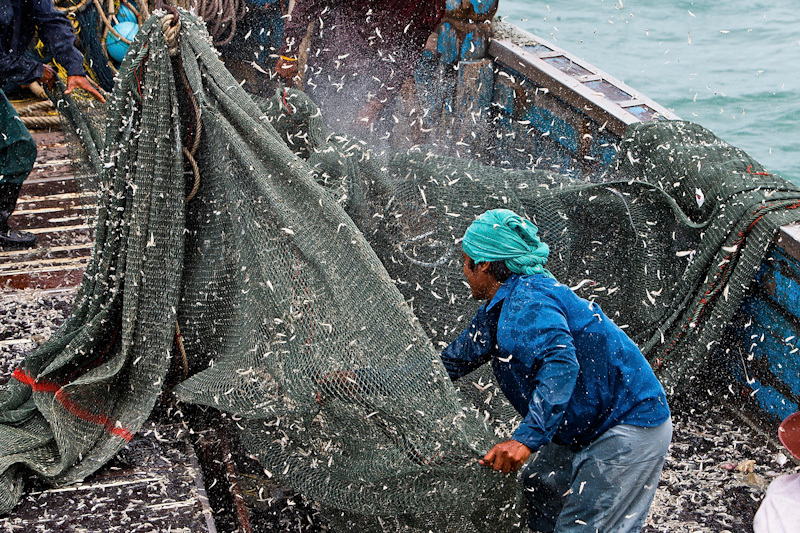
© Athit Perawongmetha / Greenpeace
During my time on the ship, I worked for more than 12 hours a day without proper time to rest. We also endured or witnessed various forms of physical abuse.
I didn’t experience any of those abuses, maybe thanks to my previous experience as a fisher. But the younger ones or those with less knowledge about the job had it far worse.
Ah, don’t get me started with the discrimination.
While the foreman and some crew got to enjoy individual cabins, all the fishers from Indonesia and the Philippines were forced to share tiny rooms. Bed? No, we slept on a thin carpet.
While they would have meat with every meal, we only got one or two pieces of chili on top of our rice. Once, I was so hungry and desperate that I stole an onion from the kitchen.
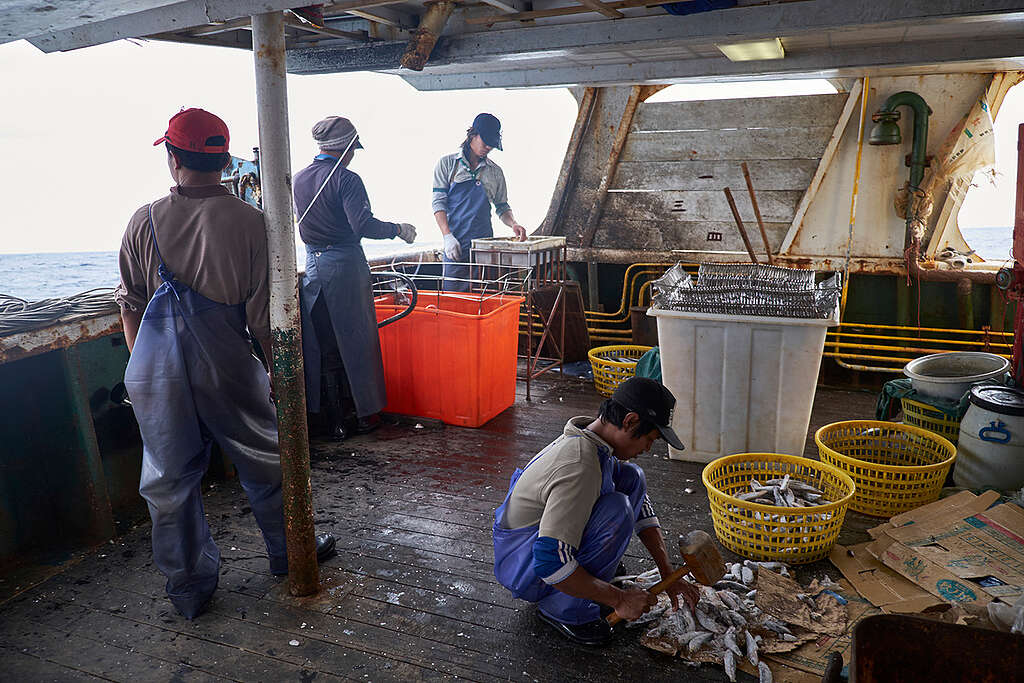
“There’s a dead body on the ship!”
Shocked. I stood frozen not knowing how to react.
The man who just broke the news to me was another Indonesian fisher from a fishing vessel across from mine. He was a ship crew member on the Lu Huang Yuan Yu 118 and I was on Lu Huang Yuan Yu 117.
This happened around June 2020. Ship crew on both vessels were busy moving catches from 117 to 118. Once done, 117 was bound to sail back towards Singapore and continue fishing.
I was nervous. So were the other 11 Indonesian fishers. We felt guilty because even though we knew someone from our country had died, we could not do anything. His body was kept in the ship’s freezer, among the boxes of squid.
“He is an Indonesian.”
“Someone has died. Why don’t they do anything?!”
“We can’t just keep quiet!”
The words were uttered among us as we tried to assess what had happened and what would come next. We agreed to contact the Indonesian Ministry of Foreign Affairs. Thankfully, one of us was able to get a signal on our cell phone. The ministry asked us to contact the Maritime Security Agency. One of our phone calls was recorded and circulated among officials at the Indonesian Ministry of Transportation.
On July 8 2020, the two fishing boats crossed into Indonesian territory. The ships were finally caught in the waters off Nipah Island by a team of law enforcement officers, including the police and military intelligence. Representatives from the manning agency were also present. Several members of the crew were arrested. The Police Chief of the Riau Islands at the time, Aris Budiman, confirmed to me and my friends that our phone call had led to an arrest.
We learned later that the dead Indonesian fisherman stored in the freezer was Hasan Apriadi, from the Indonesian province of Lampung. Hasan’s body was returned to his hometown.
The foreman of Lu Huang Yuan Yu 118 ship, 50-year-old Song Chuanyun, was named a suspect. The fishers, myself included, went back to our respective villages. For us at that time, continuing our contract with the same manning agency was not an option. We were afraid if we went back to the sea right away, we might face something even worse.
An illusion of justice
I thought I would find justice in the Batam District Court, Riau Islands.
The court held trials against the foreman of the Lu Huang Yuan Yu 118 and two people from the PT MJM manning agency, Taufiq Alwi and Totok Subagyo. The foreman was charged with the Criminal Code for the death of Hasan. However, after less than three months of trial, the court acquitted him of all charges.
The PT MJM officers were named as suspects for my case. The police and the attorney initially charged them with Trafficking in Persons (TIP) and used the Protection of Indonesian Migrant Workers Law as the alternative. However, the panel of judges switched them. He was charged with the migrant workers protection and the TIP law became the alternative.
In one court session, I told the panel of judges that the company promised me a salary of USD450 per month, with USD50 to be given to me on the ship and the remaining USD400 to be wired to my wife. In reality, my wife only received one month worth of payments out of six that I was due.
On March 12, 2021, the court found Taufiq and Totok guilty. They violated article 69 in the Law on Protection of Indonesian Migrant Workers which says an “Individual person is prohibited from conducting placement of Indonesian Migrant Workers”.
During the trial, it was revealed that PT MJM operated without licenses. However, Taufiq and Totok still managed to partner up with a foreign manning agency to recruit and send migrant fishers from Indonesia, like me, to distant-water fishing vessels. Therefore, the court considered the pair to have run the business illegally.
They were sentenced to 1 year and 4 months imprisonment and a fine of 100 million Indonesian Rupiah. The two were also asked to pay restitution to me – 148,500,500 Indonesian Rupiah or around 10,000 USD.
In my head, that amount of money was more than enough to start a small business for my family. But that never happened.
I’ve been waiting for more than two years now, and I heard they have now been released after completing their prison time.
Worse, my passport and seaman’s book, which were used as evidence during the trial, were not returned to me right away. I had to pay hundreds of thousands of rupiah to people outside the court to “take care of it”.
We won in court, but we lost in life.
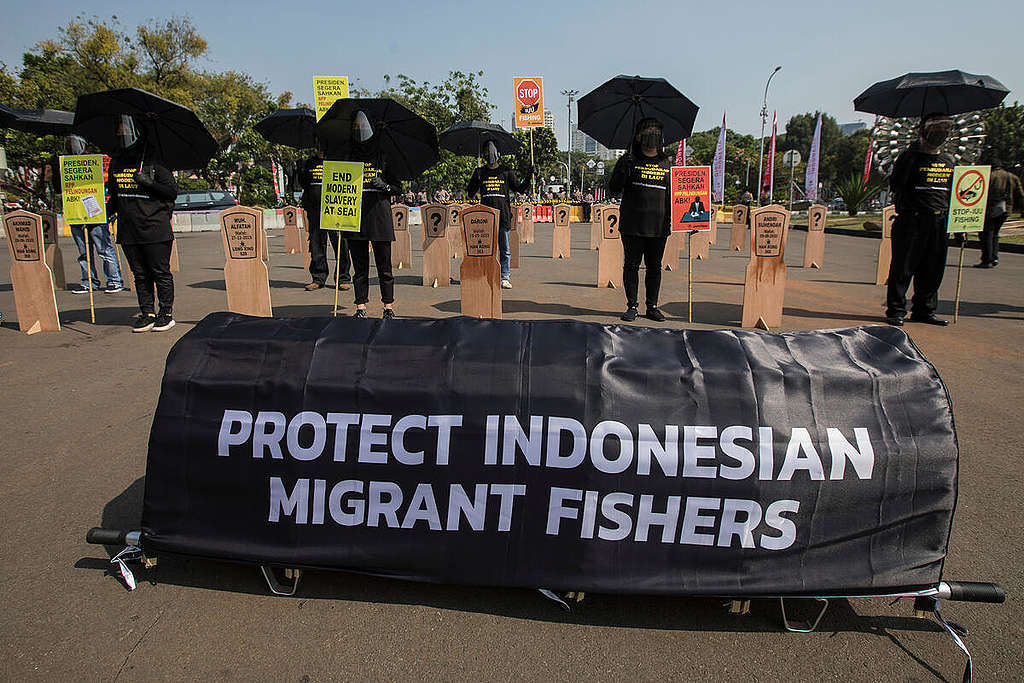
© Adhi Wicaksono / Greenpeace
To this day, I could only hope that the Indonesian government finally hears our cries for help and acts on our behalf to strictly enforce laws to end the cycle of abuse. Don’t let any more migrant fishers fall victim to injustice. It should end with me.
—
This story was summarized by the Greenpeace Southeast Asia Beyond Seafood Campaign Digital Communications Team (Haris Prabowo and Vela Andapita) based on interviews with the survivor and cross-checked with court documents and news publications. Syamsul’s first-person account has been adapted for brevity and clarity.
Since 2014, Greenpeace Southeast Asia has been working with human rights allies to push for the protection of migrant fishers to end modern slavery at sea.
You can learn more about human trafficking and forced labor issues in the distant water-fishing industry here.

